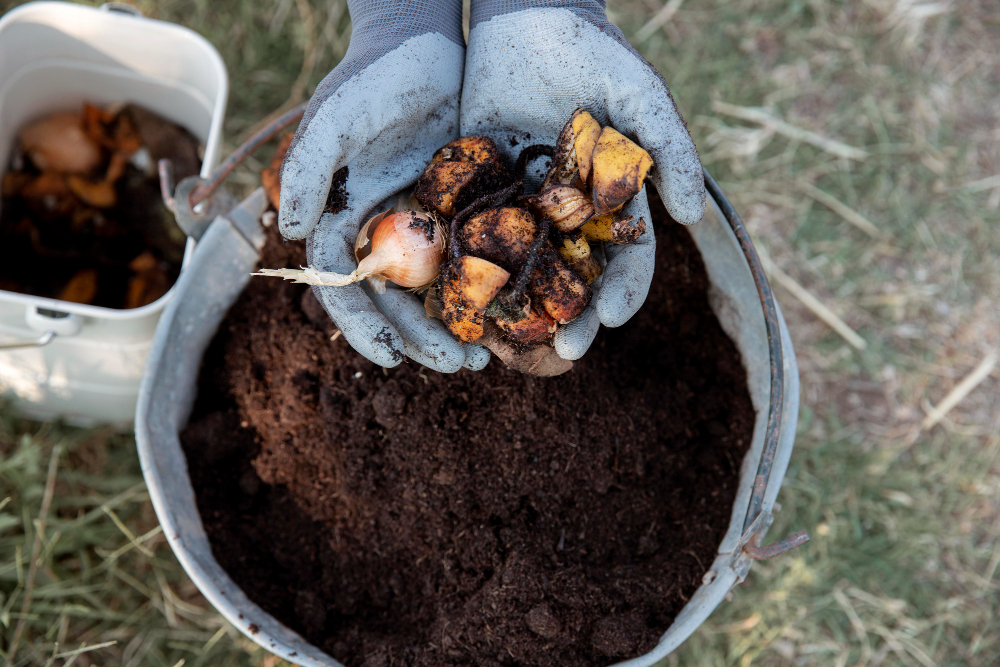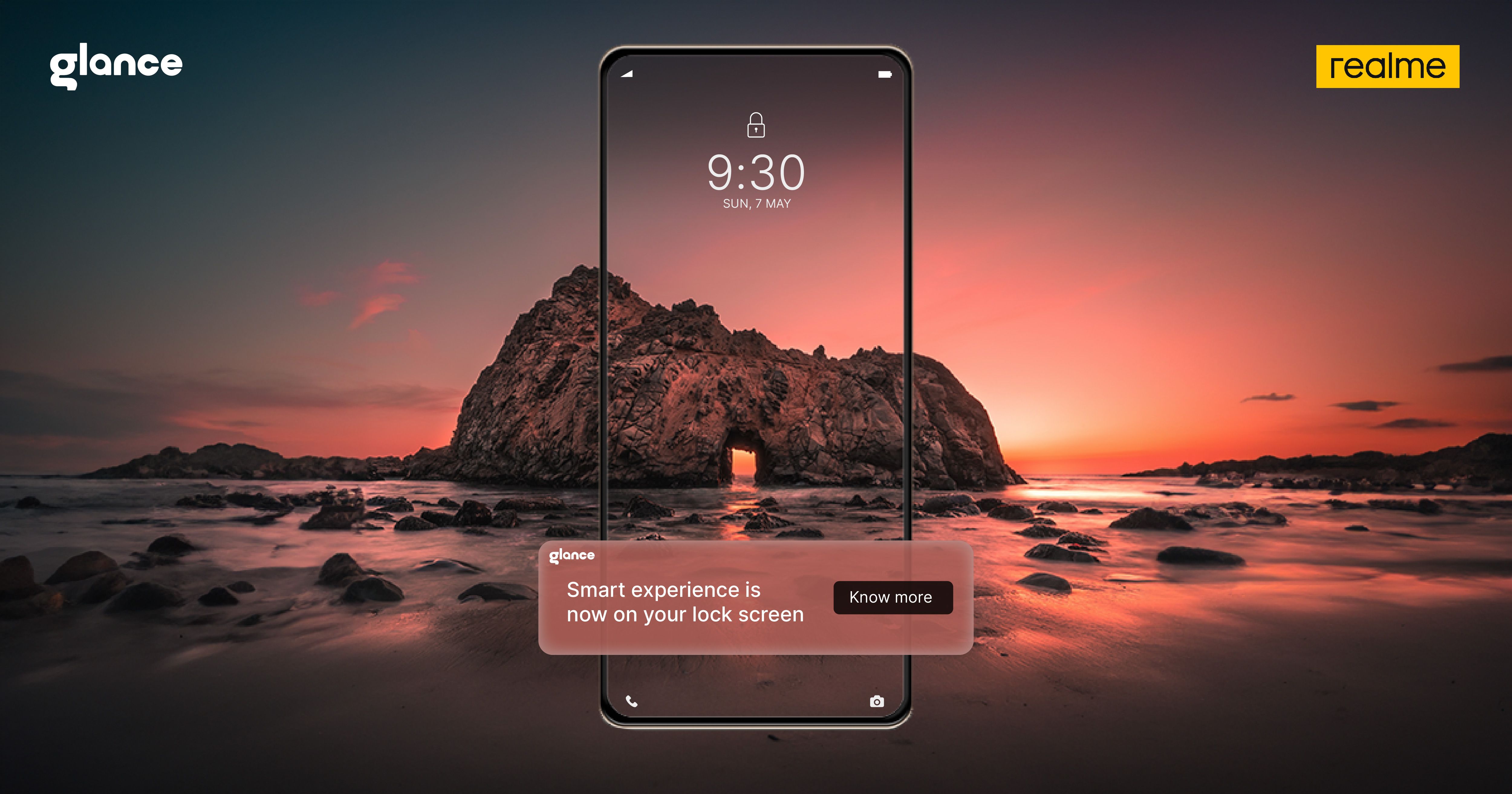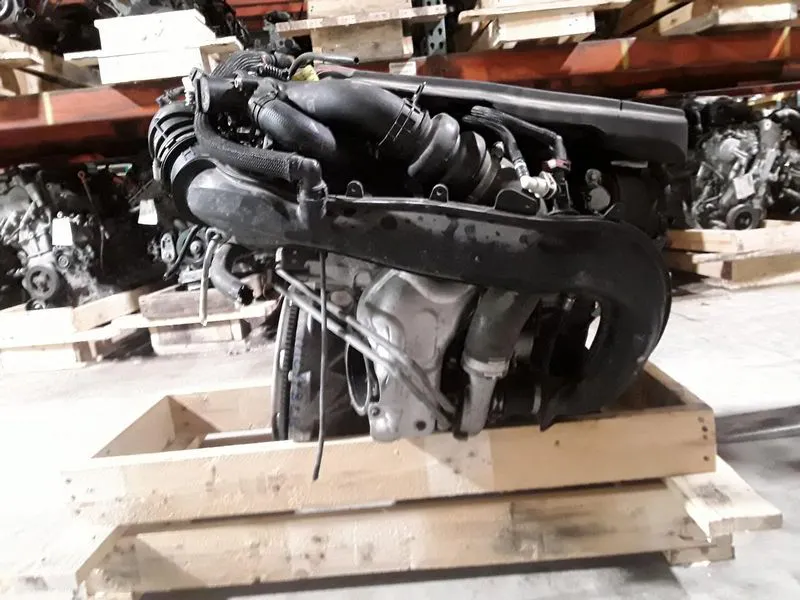Meet the 97-year-old pianist playing 7 shows a week at the Utah Shakespeare Festival
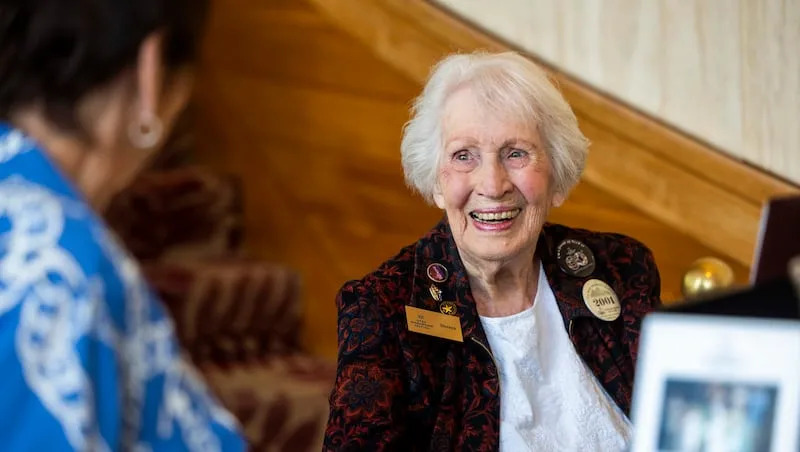 Yahoo is using AI to generate takeaways from this article. This means the info may not always match what's in the article. Reporting mistakes helps us improve the experience.Generate Key Takeaways
Yahoo is using AI to generate takeaways from this article. This means the info may not always match what's in the article. Reporting mistakes helps us improve the experience.Generate Key TakeawaysDoreen Woolley has a party trick. If someone gives her a rhythm, or just a few notes to start her off, she can make up a melody at the piano on the spot.
When asked how she does it, Woolley says, “That’s just how my brain works.” But she also has plenty of experience at the piano to back her up — nearly 90 years of it, in fact.
At 97 years old, Woolley is still using her unique skills as a pianist at the Utah Shakespeare Festival in Cedar City. For the last 22 years, Woolley has played in the lobby of the Randall L. Jones Theatre before the festival’s matinee and evening performances — without sheet music, and usually while looking up to greet people as they walk by, all without missing a beat.
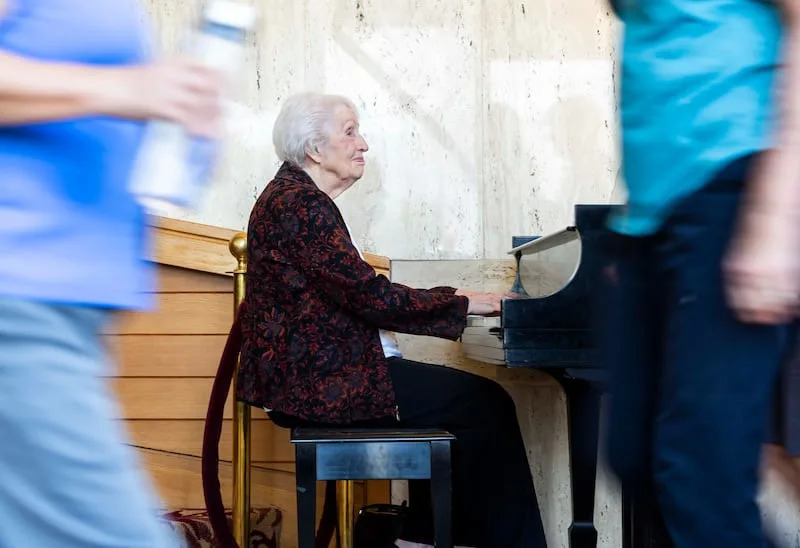 Doreen Woolley plays the piano for arriving audience members in the lobby of the Randall L. Jones Theatre before a theatrical performance at the Utah Shakespeare Festival in Cedar City on Friday, June 20, 2025. | Brice Tucker, Deseret News
Doreen Woolley plays the piano for arriving audience members in the lobby of the Randall L. Jones Theatre before a theatrical performance at the Utah Shakespeare Festival in Cedar City on Friday, June 20, 2025. | Brice Tucker, Deseret News“Because I can do what I do, I can interact with people while I’m playing,” she explained. “I’m not having to focus on what I’m playing.”
AdvertisementAdvertisement#«R46ekkr8lb2m7nfddbH1» iframe AdvertisementAdvertisement#«R86ekkr8lb2m7nfddbH1» iframeAnd that’s how Woolley likes it. Though her skill at the piano has made her a staple at the festival, she says she’s not there to “show off.” Instead, she wants to help festivalgoers feel “comfortable” and “happy” — and this year, as she plays before seven shows each week, she’s just as committed to that as she has been for the previous two decades that she’s played for the festival.
A resume of service and showmanship
When Woolley first started volunteering at the Utah Shakespeare Festival (which is on its 64th season this year) in 2001, it was not as a pianist, but as an usher.
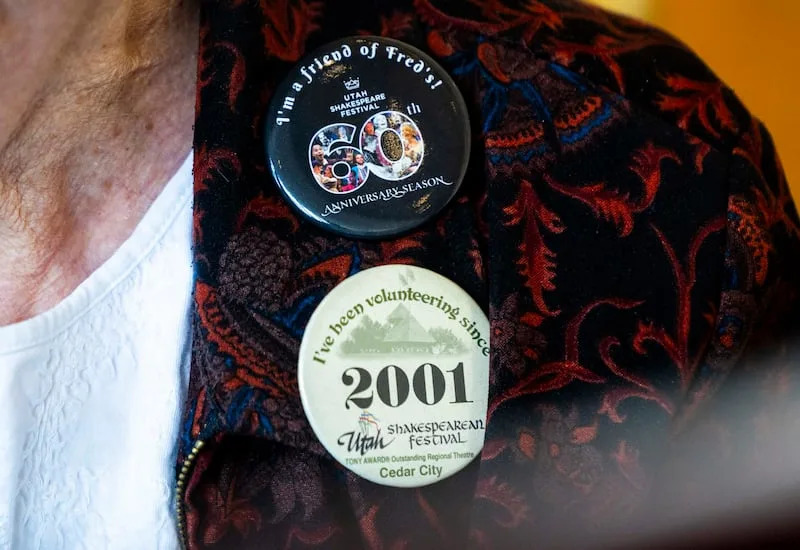 Shakespeare Festival pins adorn Doreen Woolley’s shirt as she plays the piano for arriving audience members in the lobby of the Randall L. Jones Theatre before a theatrical performance at the Utah Shakespeare Festival in Cedar City on Friday, June 20, 2025. | Brice Tucker, Deseret News
Shakespeare Festival pins adorn Doreen Woolley’s shirt as she plays the piano for arriving audience members in the lobby of the Randall L. Jones Theatre before a theatrical performance at the Utah Shakespeare Festival in Cedar City on Friday, June 20, 2025. | Brice Tucker, Deseret NewsThat was also the year she moved to Cedar City, after living all across the country and the world — her husband, Galen Woolley, traveled for his work with the military, and the couple also spent years serving as leaders in missions for The Church of Jesus Christ of Latter-day Saints in France and Hong Kong.
Woolley herself taught seminary classes for the church (she was a barrier-breaker, she says, in women teaching seminary full time and getting paid a full-time salary for it) and she earned a Ph.D. in gifted education.
AdvertisementAdvertisement#«R4dekkr8lb2m7nfddbH1» iframe AdvertisementAdvertisement#«R8dekkr8lb2m7nfddbH1» iframeOnce settled in Cedar City, though, Woolley became enmeshed in volunteering for the festival. By 2003, festival founder Fred Adams was looking for volunteer pianists to perform in the theater lobby, and Woolley auditioned for R. Scott Phillips, who later became executive director of the festival until 2016.
She played eight bars of “All I Ask of You,” from “The Phantom of the Opera,” and Phillips told her, “‘OK, that’s enough, you’re hired,’” Woolley said.
But her experience with the piano started long before then. Growing up in Sandy, Utah, Woolley began taking piano lessons when she was 8 years old, though the lessons only lasted four years. Her mother took a job cleaning laundry in order to afford it.
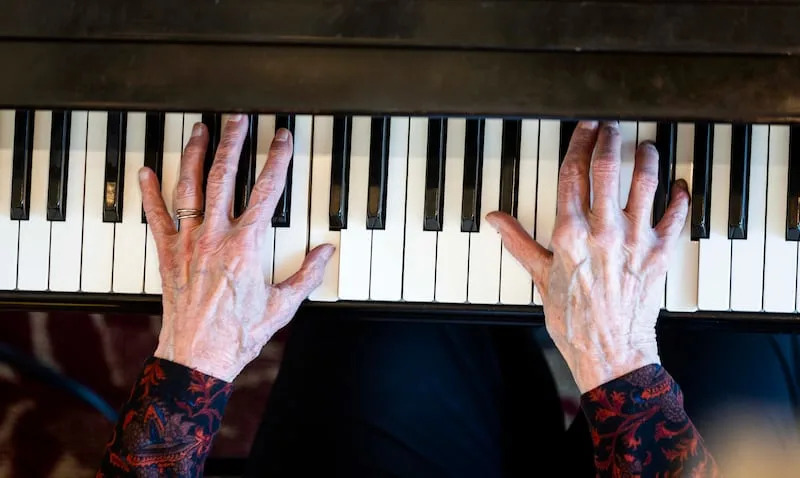 Doreen Woolley’s hands dance across the piano keys as she plays in the lobby of the Randall L. Jones Theatre before a theatrical performance at the Utah Shakespeare Festival in Cedar City on Friday, June 20, 2025. | Brice Tucker, Deseret News
Doreen Woolley’s hands dance across the piano keys as she plays in the lobby of the Randall L. Jones Theatre before a theatrical performance at the Utah Shakespeare Festival in Cedar City on Friday, June 20, 2025. | Brice Tucker, Deseret News“I didn’t have any advantages,” she said. “We were poor.”
AdvertisementAdvertisement#«R4jekkr8lb2m7nfddbH1» iframe AdvertisementAdvertisement#«R8jekkr8lb2m7nfddbH1» iframeShe continued studying music in high school, however, and she later attended the University of Utah. While at the university, she needed a part-time job to help her afford tuition, and a friend suggested that she work as an accompanist at what is now the Children’s Dance Theatre, part of the Tanner Dance Program.
Playing for the dance program was part of what helped Woolley develop her skill for improvisation.
“The idea was that Virginia (Tanner, who founded the program) would give me a rhythm,” Woolley said. “And then I just had to make up the music.”
And so, Woolley’s party trick was born. She also found that she was able to carry on conversations while she was playing.
AdvertisementAdvertisement#«R4pekkr8lb2m7nfddbH1» iframe AdvertisementAdvertisement#«R8pekkr8lb2m7nfddbH1» iframe“I finally concluded that I have a talking brain and a playing brain,” she said.
And that’s been a huge benefit to her during her time at the Shakespeare Festival.
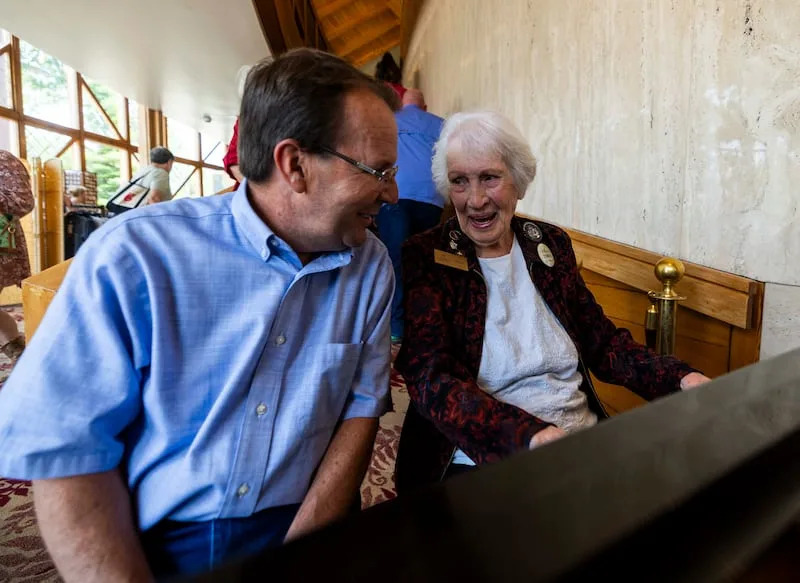 Doreen Woolley talks with Michael Bahr, the executive managing director of the Utah Shakespeare Festival, while continuing to play the piano for arriving audience members in the lobby of the Randall L. Jones Theatre before a theatrical performance in Cedar City on Friday, June 20, 2025. | Brice Tucker, Deseret News
Doreen Woolley talks with Michael Bahr, the executive managing director of the Utah Shakespeare Festival, while continuing to play the piano for arriving audience members in the lobby of the Randall L. Jones Theatre before a theatrical performance in Cedar City on Friday, June 20, 2025. | Brice Tucker, Deseret News‘Sometimes they’ll smile back’
Woolley has plenty of people, playgoers and festival volunteers alike, that stop to talk while she’s in the middle of playing in the lobby of the Randall L. Jones Theatre, whether it’s to compliment her playing, to request a favorite song or even just to say hi. And to her, that’s as much a part of the “job” as the music.
“I can interact with people as they’re coming by,” she said. “And sometimes they come by with really grumpy looks. So I try to smile at them and talk to them. Sometimes they’ll smile back. Sometimes they’re still pretty grumpy.”
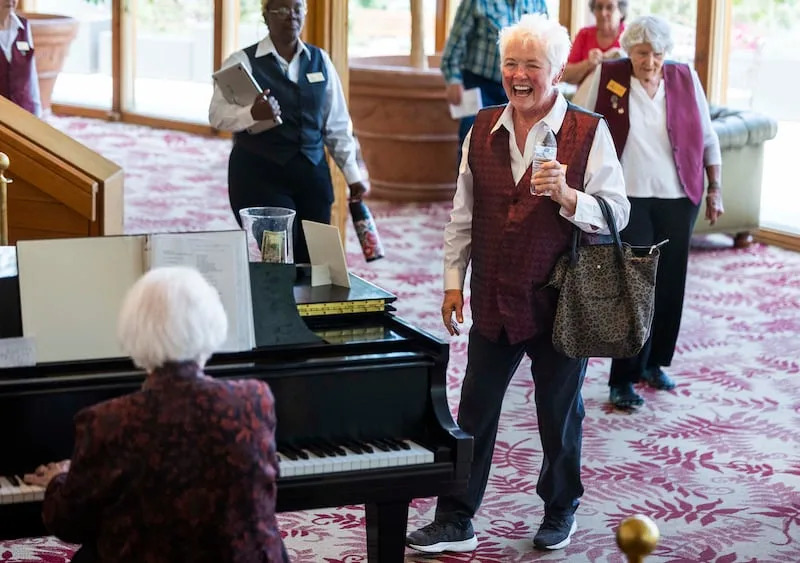 Festival volunteer Ellen Boyer, right, smiles while listening to Doreen Woolley play the piano in the lobby of the Randall L. Jones Theatre before a theatrical performance at the Utah Shakespeare Festival in Cedar City on Friday, June 20, 2025. | Brice Tucker, Deseret News
Festival volunteer Ellen Boyer, right, smiles while listening to Doreen Woolley play the piano in the lobby of the Randall L. Jones Theatre before a theatrical performance at the Utah Shakespeare Festival in Cedar City on Friday, June 20, 2025. | Brice Tucker, Deseret NewsShe remembers one occasion when a visitor asked her to play “Edelweiss,” from “The Sound of Music.” The festival happened to be performing “The Sound of Music” that year, and because of that, Woolley had been asked not to play any of the songs from the musical during her pre-show performances.
AdvertisementAdvertisement#«R52ekkr8lb2m7nfddbH1» iframe AdvertisementAdvertisement#«R92ekkr8lb2m7nfddbH1» iframeThe visitor was insistent, however, so Woolley agreed to play it — even starting the song over in a new key when the woman told her “my husband can’t sing in that key.”
As she began to play, the woman’s husband began to sing along — and soon, Woolley said, the entire lobby joined in.
There are certain visitors that Woolley has come to recognize, because they return to the festival year after year — and request the same songs from her year after year, too.
“I have one guy who always comes and he always, always asks for ‘Moonlight in Vermont,’” Woolley says. “He just walks up and says, ‘Moonlight in Vermont.’” And Woolley will play it.
AdvertisementAdvertisement#«R57ekkr8lb2m7nfddbH1» iframe AdvertisementAdvertisement#«R97ekkr8lb2m7nfddbH1» iframeHer connections with the playgoers, the festival’s Executive Managing Director Michael Bahr told the Deseret News, are part of what makes Woolley such an integral part of the festival.
“What she plays, it’s ‘Edelweiss’ with an impact,” Bahr said.
‘Dear Miss Pianist’
Woolley has been pleasantly surprised by her connection with one group of festivalgoers in particular: kids and teenagers.
Woolley has amassed a collection of handwritten notes and even drawings that listeners have left for her at the piano in the theater lobby over the years. Many of them, she says, are from kids. She receives too many to keep all of them, but she does hold on to some.
AdvertisementAdvertisement#«R5dekkr8lb2m7nfddbH1» iframe AdvertisementAdvertisement#«R9dekkr8lb2m7nfddbH1» iframeOne note that she kept was addressed simply, “Dear Miss Pianist,” and was signed by two teenagers. The teenagers wrote that they were “exhausted” after attending the festival’s annual student Shakespeare Competition, but after listening to Woolley play, they felt “refilled.”
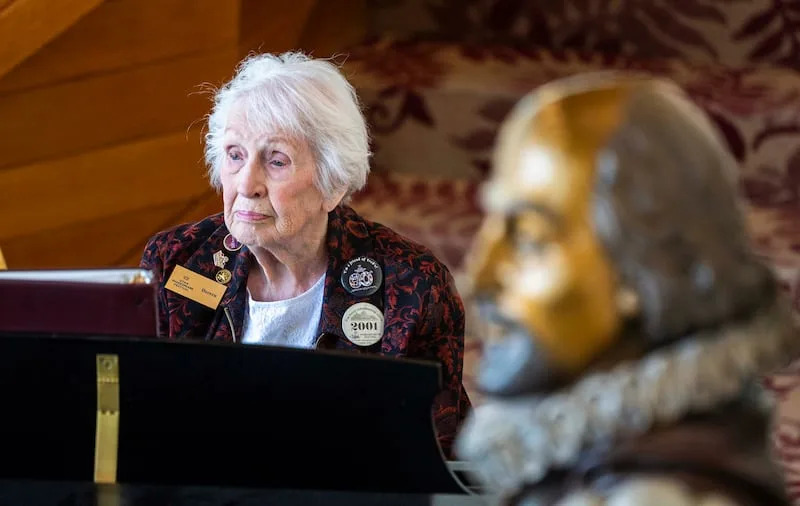 Doreen Woolley plays the piano for arriving audience members in the lobby of the Randall L. Jones Theatre before a theatrical performance at the Utah Shakespeare Festival in Cedar City on Friday, June 20, 2025. | Brice Tucker, Deseret News
Doreen Woolley plays the piano for arriving audience members in the lobby of the Randall L. Jones Theatre before a theatrical performance at the Utah Shakespeare Festival in Cedar City on Friday, June 20, 2025. | Brice Tucker, Deseret News“That has been one of the most amazing things to me,” Woolley said of the response from young people. “The kind of thing that I play, that these kids are responding to. Because this is not their milieu. This is not what they’re used to hearing.”
Yet she says that high school students in particular are some of the most enthusiastic about singing along to her music. Though some people may have worries about the next generation, Woolley doesn’t share those concerns.
“They’re just fine,” she said.
AdvertisementAdvertisement#«R5jekkr8lb2m7nfddbH1» iframe AdvertisementAdvertisement#«R9jekkr8lb2m7nfddbH1» iframeLooking ahead, Woolley isn’t entirely sure what the future holds, joking that she’s already “failed retirement.” But she’s certainly made an impact on many as she’s played with the Shakespeare Festival for over a third of its 64-year history.
“For me, Doreen is emblematic, metaphoric, the epitome of what the festival represents,” Bahr said. “A volunteer who has loved the festival and what it has, and has brought a standard of excellence in music and connectivity with the patrons. The fact she can list all of those individual patrons who come in and say, ‘Play this for me,’ … I think that’s what the festival is.”
As for Woolley, she also feels the importance of the connections that she’s made with people over the years.
“I’ve long since learned that my job is to help people feel comfortable and be happy and have a really good experience here,” she says.
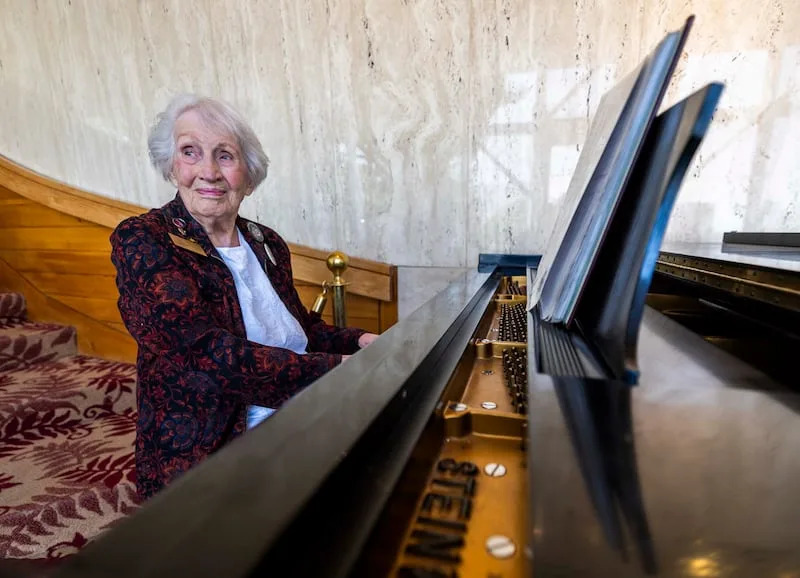 Doreen Woolley plays the piano for arriving audience members in the lobby of the Randall L. Jones Theatre before a theatrical performance at the Utah Shakespeare Festival in Cedar City on Friday, June 20, 2025. | Brice Tucker, Deseret News
Doreen Woolley plays the piano for arriving audience members in the lobby of the Randall L. Jones Theatre before a theatrical performance at the Utah Shakespeare Festival in Cedar City on Friday, June 20, 2025. | Brice Tucker, Deseret News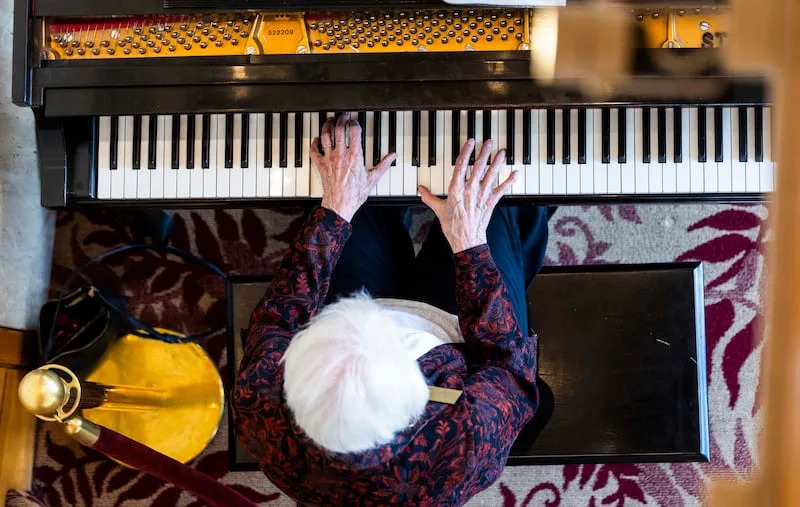 Doreen Woolley plays the piano for arriving audience members in the lobby of the Randall L. Jones Theatre before a theatrical performance at the Utah Shakespeare Festival in Cedar City on Friday, June 20, 2025. | Brice Tucker, Deseret News
Doreen Woolley plays the piano for arriving audience members in the lobby of the Randall L. Jones Theatre before a theatrical performance at the Utah Shakespeare Festival in Cedar City on Friday, June 20, 2025. | Brice Tucker, Deseret News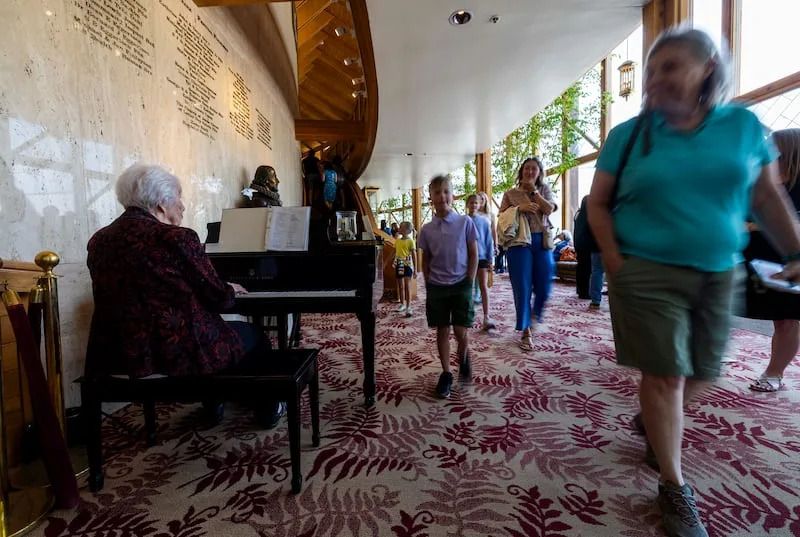 Doreen Woolley plays the piano for arriving audience members in the lobby of the Randall L. Jones Theatre before a theatrical performance at the Utah Shakespeare Festival in Cedar City on Friday, June 20, 2025. | Brice Tucker, Deseret News
Doreen Woolley plays the piano for arriving audience members in the lobby of the Randall L. Jones Theatre before a theatrical performance at the Utah Shakespeare Festival in Cedar City on Friday, June 20, 2025. | Brice Tucker, Deseret News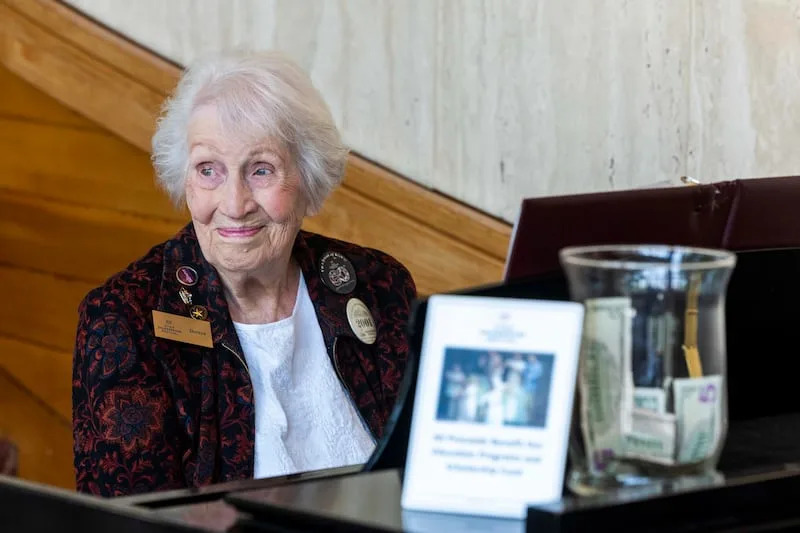 Doreen Woolley smiles as she plays the piano for arriving audience members in the lobby of the Randall L. Jones Theatre before a theatrical performance at the Utah Shakespeare Festival in Cedar City on Friday, June 20, 2025. | Brice Tucker, Deseret NewsAdvertisementAdvertisement#«R5sekkr8lb2m7nfddbH1» iframe AdvertisementAdvertisement#«R9sekkr8lb2m7nfddbH1» iframe
Doreen Woolley smiles as she plays the piano for arriving audience members in the lobby of the Randall L. Jones Theatre before a theatrical performance at the Utah Shakespeare Festival in Cedar City on Friday, June 20, 2025. | Brice Tucker, Deseret NewsAdvertisementAdvertisement#«R5sekkr8lb2m7nfddbH1» iframe AdvertisementAdvertisement#«R9sekkr8lb2m7nfddbH1» iframe 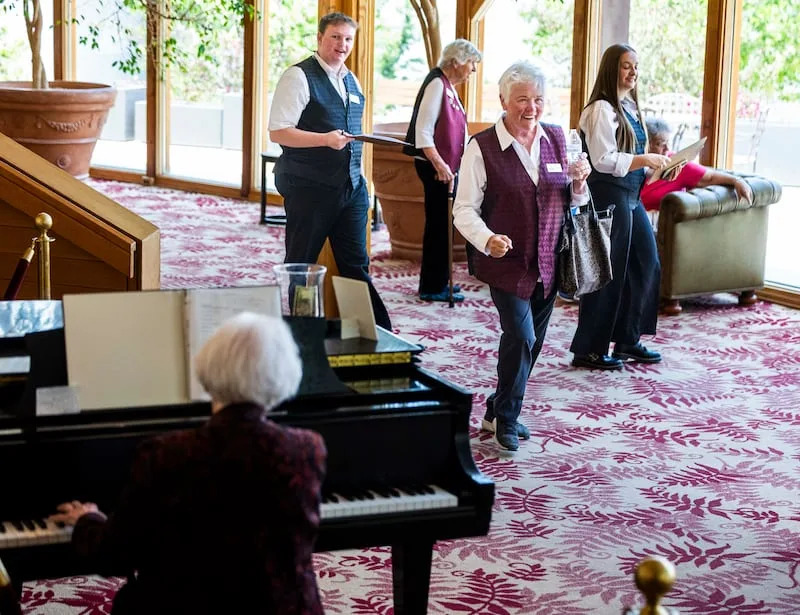 Festival volunteer Ellen Boyer, right, dances while listening to Doreen Woolley play the piano in the lobby of the Randall L. Jones Theatre before a theatrical performance at the Utah Shakespeare Festival in Cedar City on Friday, June 20, 2025. | Brice Tucker, Deseret News
Festival volunteer Ellen Boyer, right, dances while listening to Doreen Woolley play the piano in the lobby of the Randall L. Jones Theatre before a theatrical performance at the Utah Shakespeare Festival in Cedar City on Friday, June 20, 2025. | Brice Tucker, Deseret News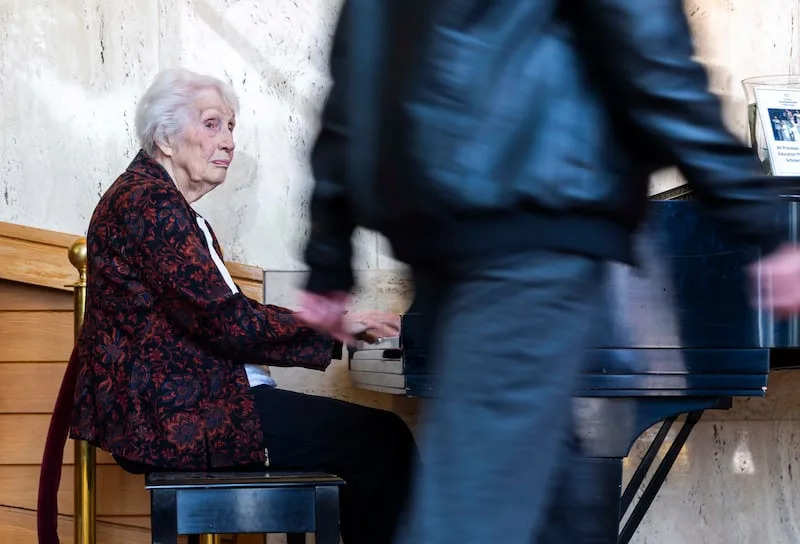 Doreen Woolley plays the piano for arriving audience members in the lobby of the Randall L. Jones Theatre before a theatrical performance at the Utah Shakespeare Festival in Cedar City on Friday, June 20, 2025. | Brice Tucker, Deseret News
Doreen Woolley plays the piano for arriving audience members in the lobby of the Randall L. Jones Theatre before a theatrical performance at the Utah Shakespeare Festival in Cedar City on Friday, June 20, 2025. | Brice Tucker, Deseret News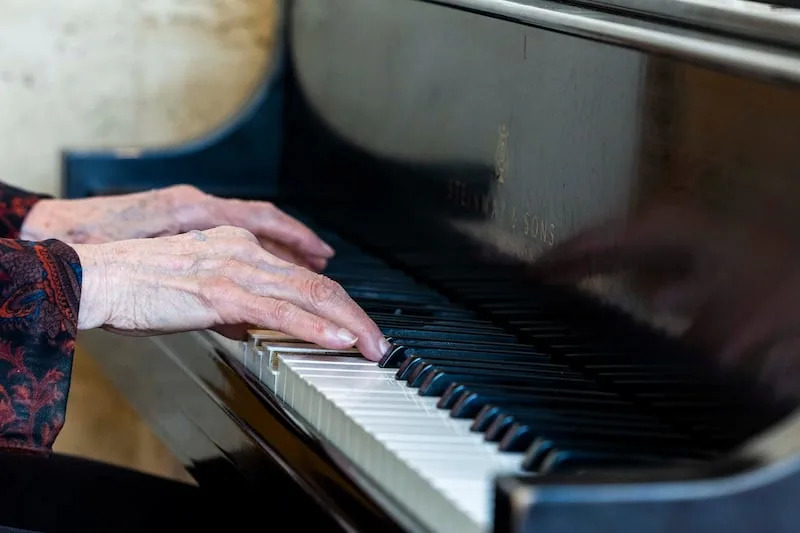 Doreen Woolley’s hands dance across the piano keys as she plays in the lobby of the Randall L. Jones Theatre before a theatrical performance at the Utah Shakespeare Festival in Cedar City on Friday, June 20, 2025. | Brice Tucker, Deseret News
Doreen Woolley’s hands dance across the piano keys as she plays in the lobby of the Randall L. Jones Theatre before a theatrical performance at the Utah Shakespeare Festival in Cedar City on Friday, June 20, 2025. | Brice Tucker, Deseret News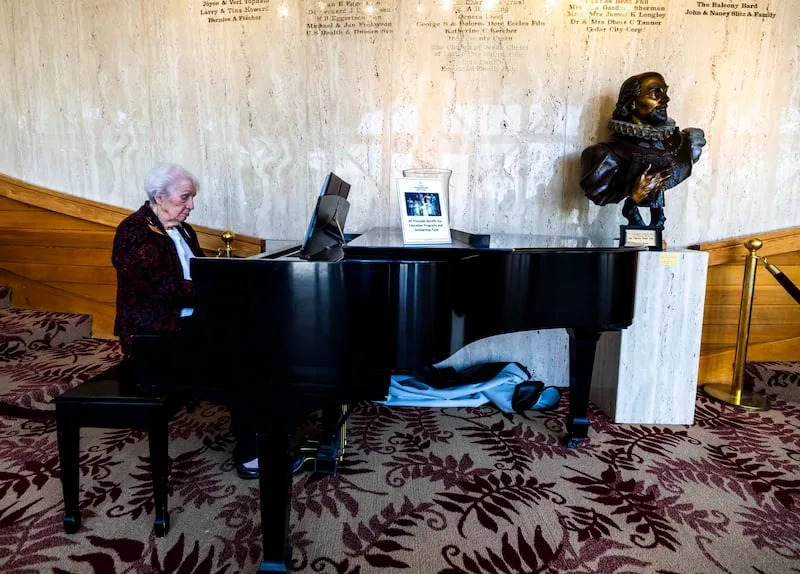 Doreen Woolley plays the piano next to a bust of Shakespeare for arriving audience members in the lobby of the Randall L. Jones Theatre before a theatrical performance at the Utah Shakespeare Festival in Cedar City on Friday, June 20, 2025. | Brice Tucker, Deseret News
Doreen Woolley plays the piano next to a bust of Shakespeare for arriving audience members in the lobby of the Randall L. Jones Theatre before a theatrical performance at the Utah Shakespeare Festival in Cedar City on Friday, June 20, 2025. | Brice Tucker, Deseret News

